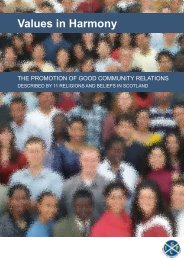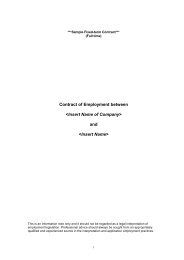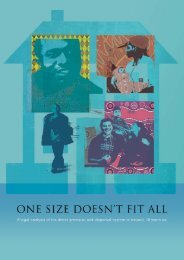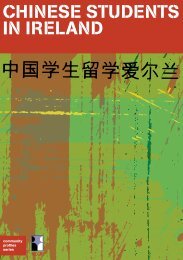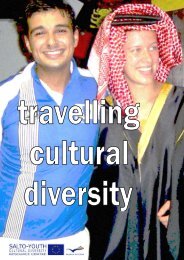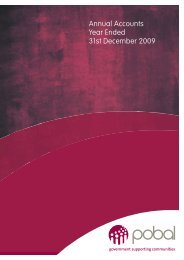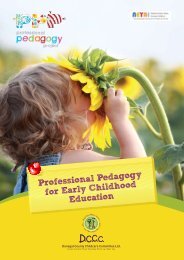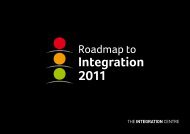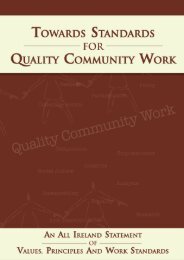Intercultural Education in the Post-Primary School - National Council ...
Intercultural Education in the Post-Primary School - National Council ...
Intercultural Education in the Post-Primary School - National Council ...
You also want an ePaper? Increase the reach of your titles
YUMPU automatically turns print PDFs into web optimized ePapers that Google loves.
APPROACHES AND METHODOLOGIES 6• allows for flexibility of teach<strong>in</strong>gmethodologies and so accommodatesdifferent k<strong>in</strong>ds of <strong>in</strong>telligence anddifferent learn<strong>in</strong>g styles• builds skills of problem-solv<strong>in</strong>g, criticalth<strong>in</strong>k<strong>in</strong>g and co-operation• requires an atmosphere of trust andsupport <strong>in</strong> order to ensure that studentsdo engage and feel secure <strong>in</strong> express<strong>in</strong>g<strong>the</strong>ir own views or <strong>in</strong> try<strong>in</strong>g out newskills• promotes action, as students learn torecognise <strong>the</strong>ir own capacity and selfefficacy.In approach<strong>in</strong>g concepts like <strong>the</strong> value ofdiversity or rights and responsibilities, or<strong>in</strong> learn<strong>in</strong>g skills such as negotiatedsolutions to conflict it is often useful toutilise real-life situations with<strong>in</strong> <strong>the</strong>learn<strong>in</strong>g process. The active learn<strong>in</strong>gmethodologies outl<strong>in</strong>ed <strong>in</strong> <strong>the</strong> exemplarswhich support <strong>the</strong>se guidel<strong>in</strong>es (availableon <strong>the</strong> CD-ROM and at www.ncca.ie)offer a range of ideas for do<strong>in</strong>g this.Clearly, <strong>the</strong>re are times when fraughtemotions make this difficult. The sectionon deal<strong>in</strong>g with controversial issues at <strong>the</strong>end of this chapter might be useful <strong>in</strong> suchsituations.Active learn<strong>in</strong>g methodsStructured discussionDiscussion has a key role <strong>in</strong> <strong>in</strong>terculturaleducation. It provides a chance forstudents to talk about <strong>the</strong>ir ideas andfeel<strong>in</strong>gs and can open up opportunities fordevelop<strong>in</strong>g or chang<strong>in</strong>g <strong>the</strong>ir ideas orfeel<strong>in</strong>gs where appropriate. It can developa range of skills such as ask<strong>in</strong>g questions,active and positive listen<strong>in</strong>g, tak<strong>in</strong>g turns,summaris<strong>in</strong>g views, etc.Crucial to engag<strong>in</strong>g <strong>in</strong> open discussion isan atmosphere of trust and support.Students need to feel that <strong>the</strong>y can speak<strong>the</strong>ir m<strong>in</strong>d. While students should beconfronted about <strong>in</strong>accurate, hurtful orhostile statements, this should be done <strong>in</strong>such a way that <strong>the</strong>y are affirmed as aperson, while <strong>the</strong>ir view is challenged.It is not a good idea to throw open adiscussion without first provid<strong>in</strong>g someguidance and ground rules for discussion.It is also <strong>the</strong> teacher’s role to provide asuitable stimulus for generat<strong>in</strong>g discussion,such as a poem, newspaper article, piece ofmusic, visual stimulus or physical activity.A sample set of ground rules might <strong>in</strong>clude• everyone is shown respect• everyone is given a chance to speak <strong>in</strong><strong>the</strong> group• everyone is listened to – no <strong>in</strong>terruptions• no put-downs• everyone’s right to <strong>the</strong>ir op<strong>in</strong>ion isrespected• everyone is expected to back up <strong>the</strong>irop<strong>in</strong>ion• everyone has <strong>the</strong> freedom to change<strong>the</strong>ir op<strong>in</strong>ion based on reflectivediscussion• no generalisations e.g. ‘all refugees are...all Muslims are...’.Adapted from Chang<strong>in</strong>g Perspectives:Cultural Diversity and Equality <strong>in</strong> Irelandand <strong>the</strong> Wider World (A resource forCSPE) 2002, CDVEC CurriculumDevelopment Unit.Simulation games and role-playSimulation games and role-play are widelyused to provide students with a chance to‘live out’ a real life situation <strong>in</strong> a safeenvironment. For effective role-play<strong>in</strong>g<strong>the</strong>re is need for careful preparation,<strong>in</strong>clud<strong>in</strong>g preparation of role-cards,reflection questions and any relevantbackground <strong>in</strong>formation. It is important tochoose a <strong>the</strong>me that is clearly focused and<strong>Intercultural</strong> <strong>Education</strong> <strong>in</strong> <strong>the</strong> <strong>Post</strong>-<strong>Primary</strong> <strong>School</strong> 81




